- Home
- Alice McDermott
At Weddings and Wakes
At Weddings and Wakes Read online
The author and publisher have provided this e-book to you for your personal use only. You may not make this e-book publicly available in any way. Copyright infringement is against the law. If you believe the copy of this e-book you are reading infringes on the author’s copyright, please notify the publisher at: us.macmillanusa.com/piracy.
Table of Contents
Title Page
Copyright Notice
Chapter 1
Chapter 2
Chapter 3
Chapter 4
Chapter 5
Chapter 6
Chapter 7
Chapter 8
Chapter 9
Chapter 10
Chapter 11
Chapter 12
Chapter 13
Acknowledgements
Preview: Someone
About the Author
Copyright Page
For Bill and Kevin,
Willie and Eames
TWICE A WEEK in every week of summer except the last in July and the first in August, their mother shut the front door, the white, eight-panel door that served as backdrop for every Easter, First Holy Communion, confirmation, and graduation photo in the family album, and with the flimsy screen leaning against her shoulder turned the key in the black lock, gripped the curve of the elaborate wrought-iron handle that had been sculpted to resemble a black vine curled into a question mark, and in what seemed a brief but accurate imitation of a desperate housebreaker, wrung the door on its hinges until, well satisfied, she turned, slipped away from the screen as if she were throwing a cloak from her shoulders, and said, “Let’s go.”
Down the steps the three children went before her (the screen door behind them easing itself closed with what sounded like three short, sorrowful expirations of breath), the two girls in summer dresses and white sandals, the boy in long khaki pants and a thin white shirt, button-down collar and short sleeves. She herself wore a cotton shirtwaist and short white gloves and heels that clicked against the concrete of the driveway and the sidewalk and sent word across the damp morning lawns that the Daileys (Lucy and the three children) were once again on their way to the city.
The neighborhood at this hour was still and fresh and full of birdsong and the children marked the ten shady blocks to the bus with three landmarks. The first was the ragged hedge of the Lynches’ corner lot where lived, in a dirty house made ramshackle by four separate, slapdash additions, ten children, three grandparents, a mother, a father, and a bachelor uncle who was responsible, no doubt, for the shattered brown bottle that lay on the edge of the driveway. The second was a slate path that intersected a neat green lawn, each piece of slate the exact smooth color, either lavender or gray or pale yellow, of a Necco candy wafer. Third was the steel eight-foot fence at the edge of the paved playground of the school they had all attended until June and would attend again in September, although it appeared to them as they passed it now as something forlorn and defeated, something that the wind might take away—something that could rumble with footsteps and shriek with bells and hold them in its belly for six hours each day only in the wildest, the most terrible, the most unimaginable (and, indeed, not one of the three even imagined it as they passed) of dreams.
At the bus stop, the tall white sign with its odd, flat, perforated pole drew them like magnets. They touched it, towing the pebbles at its base. They jumped up to slap its face. They held it in one hand and leaned out into the road looking for the first glint of sun against the white crown and wide black windshield of the bus that would take them to the avenue.
Their mother smoked a cigarette on the sidewalk behind them, as she did on each of these mornings, her pocketbook hung in the crook of her arm, the white gloves she would pull on as soon as the bus appeared squeezed together in her free hand. The sun at nine-fifteen had already begun to push its heat through the soles of her stockings and beneath the fabric-covered cardboard of her belt. She touched the silver metal of its buckle, breathed in to gain a moment’s space between fabric and flesh. Across the street a deli and a bar and a podiatrist’s office shared a squat brick building that was shaded by trees. Beyond it a steeple rose—the gray steeple of the Presbyterian church—into a sky that was blue and cloudless. Swinging from the bus-stop sign, the children failed to imagine for their mother, just as they had failed to imagine for the building where they went to school, any other life but the still and predictable one she presented on those mornings, although even as she dropped her cigarette to her side and stepped on the butt with her first step toward them (it was a woman’s subtle, sneaky way of finishing a smoke) she was aware of the stunned hopelessness with which she moved. Of time draining itself from the scene in a slow leak.
Briefly terrified, the younger girl took her mother’s hand as the bus wheezed toward the curb.
Even the swift, gritty breeze that rushed through the slices of open window seemed at this hour to be losing the freshness of morning—some cool air clung to it, but in patches and tatters, as if the coming heat of the afternoon had already begun to wear through.
The children squinted their eyes against it and shook back their hair. Watching the houses go by, they were grateful that theirs was not one of them to be left, after each stop, in the expelled gray exhaust, and as the bus moved past the cemetery they felt—all unconsciously—the eternal disappointment of the people whose markers lay so near the road. Who saw (because they imagined the dead to be at eye level with the ground, the grass pulled like a blanket up to their noses) the walking living through the black stakes of the iron fence and the filtered refuse of what seemed many summers—ice-cream wrappers, soda cans, cigarette butts, and yellowed athletic socks—that had gathered at its base.
Where the cemetery ended, the stonecutter’s yard began, a jumble of unmarked and broken tombstones that parodied the order of the real graves and seemed in its chaos to indicate a backlog of orders, a hectic rate of demand. (Their father’s joke, no matter how many times they drove this way: “People are dying to get in there.”) Then, at the entrance to the yard, a showroom—it looked for all the world like a car showroom—that displayed behind its tall plate glass huge marble monuments and elaborate crypts and the slithering reflected body of their bus, their own white faces at three windows.
They passed another church, a synagogue, and then a last ramshackle yard where chickens pecked at the dirt in speckled sunlight and what the children understood to be a contraption in which wine was made (although they couldn’t say how they knew this) hulked among the vines and the shadows, through which they also glimpsed, passing by, a toothless Italian man named (and they could not say how they knew this, either) Mr. Hootchie-Koo, as he shuffled through the dirt in baggy pants and bedroom slippers.
Now the large suburban trees fell away. There was another church and then on both sides of the road a wide expanse of shadeless parking lot, the backs of stores, traffic. Their mother raised her hand to pull the cord that rang the buzzer and then waited in the aisle for them to go before her toward the front, hand over hand like experienced seamen between the silver edges of the seats. Their first sight as they touched the ground was always the identical Chinese couple in the narrow laundry, looking up through the glass door from their eternal white and pale blue pile.
As they stood on the corner the bus they had just deserted, suddenly grown taller and louder and far more dangerous, passed before their noses, spilling its heat on their thin shoes.
When the light changed they crossed. Here the sidewalk was wider, twice as wide as it was where they lived, and they began to catch a whiff, a sense, of their destination, the way some sailors, hundreds of miles out, are said to catch the first scent of land. There was a bar—a saloon was how the children thought
of it—with a stuccoed front and a single mysterious brown window, a rounded doorway like the entrance to a cave that breathed a sharp and darkly shining breath upon them, a distillation of night and starlight and Scotch. Two black men passed by. In a dark and narrow candy store that smelled exotically of newsprint and bubble gum they were each allowed to choose one comic book from the wooden rack and their mother gathered these in her gloved hand, placed them, a copy of the Daily News, and a pack of butterscotch Life Savers on the narrow shelf beside the register, and paid with a single bill.
Outside, she redistributed the comics and placed a piece of candy on each tongue, fortifying the children, or so it seemed, for the next half of their journey. She herded them into the shaded entry of a clothing store, another cave formed by two deep windows that paralleled each other and contained, it seemed, a single example of every item sold by the store, most of which was worn by pale mannequins with painted hair and chipped fingers or mere pieces of mannequins: head, torso, foot. The store was closed at this hour and the aisles were lined with piles of thin gray cardboard boxes that sank into one another and overflowed with navy-blue socks or white underpants as if these items had somehow multiplied themselves throughout the night.
When the bus appeared it was as if from the next storefront and they ran across the wide sidewalk to meet it, their mother pausing behind them to step on another cigarette. She offered the driver the four slim transfers while the children picked their way down the aisle. There was not the luxury of empty seats there had been on the first bus and so they squeezed together three to a narrow seat, their mother standing in the aisle beside them, her dress, her substantial thigh and belly underneath blue-and-white cotton, blocking them, shielding them, all unaware, from the drunks and the gamblers and the various tardy (and so clearly dissipated) businessmen who rode this bus though never the first because this was the one that both passed the racetrack and crossed the city line.
All unaware, noses in their comics, her three children leaned together in what might have been her shadow, had the light been right, but was in reality merely the length that the warmth of her body and the odor of her talc extended.
At the subway, the very breath of their destination rose to meet them in the constant underground breeze that began to whip the girls’ dresses as soon as they descended the first of the long set of dirty stairs. (“No spitting” a sign above their heads read, proving to them that they were entering an exotic and dangerous realm where people might, at any given moment, begin spitting.) The long corridors echoed with their mother’s footsteps and roared distantly with the comings and goings of the trains. There were ads along the walls, not as large or as high as billboards but somehow just as compelling, and if it had not been for their mother’s sudden haste, for she had begun rushing as soon as they left the bus, they would have lingered to read them more carefully, to study their bold messages and larger-than-life faces and garish cartoons, to absorb more fully what appeared to them to be a vivid, still-life bazaar.
And then bars, prison bars, a wall of bars, and, even more fantastically, a wall of revolving doors all made of black iron bars. Their mother passed another bill through the tiny halfmoon aperture in what otherwise seemed a solid box lit green from within and received, in reply to her shouted “Four, please,” a sliding handful of tokens and coins.
They were each given their own, given only the time it took to cross the dim expanse from token booth to turnstile to feel between their fingers the three opened spaces in the center of the embossed coin (a tactile memory that would return to them years later when they drew their first peace symbols) before they slipped it into the eternity of the machine and pressed with hands or waist or heart the single wooden paddle that clicked, gave way, and admitted them.
Now they were running, their mother calling, although she was running too, “Stay together, stay together, it’s all right if we miss it,” down another flight of stairs and then, hearts pounding, in through the metal doors of the subway car, one, two, three, four. The white pole at the center of the car was cool against their palms and their foreheads. After the first jolt of the train’s forward movement, after they had recovered their breath and their balance, they began, without a word, to cross the length of the cars. The boy, the oldest, was in the lead and he yanked open each door and faced the rush of heat and sound with a determined nonchalance that might have served him well in war had he ever been asked to serve. His sister followed, crossing the jiggling space between the cars, the moving, goose-bumped metal of the jarring platform, the swinging, waist-high chain that seemed neither thick enough to hold the cars together nor to hold her in should she be tossed against it, with her breath stopped, her arms extended like a tightrope walker’s.
Then the youngest child, her hand held high above her head in her mother’s gloved one, her eyes wide enough to reflect the occasional spark against steel, the occasional white tunnel light. Rushing through Queens, closing in on Brooklyn, her mother moved across that loud and dark and precarious distance between the subway cars with a surefootedness she could never master in the suburbs, and only the desperate, painful and much-welcomed tightening of her grip on her daughter’s hand whenever a spark rose or the cars banged violently together betrayed the fact that she was a city girl no longer.
Inside the brightly lit cars, on yellow cane or red plastic seats, under slow-spinning ceiling fans, their fellow passengers turned at the burst of sound that came from the opened door at the back of the car. Turned and saw first a thin boy of ten or twelve, his dark hair cut close, his jaw set, his Catholic school shirt and pale skin and large dark eyes making them think of altar boys and angels. And following right behind him a girl, not tall but becoming increasingly lanky, it was clear, with dark red hair that curled at her shoulders. A beauty, perhaps, when her teeth were straightened and those bones took on some flesh. And then, nearly dangling from her mother’s arm, another in the same white eyelet dress. No beauty here, what with the freckles on the moon face and those small green eyes, but it was she they smiled at, those who smiled, she who drew them to smile up at the mother (the door sliding shut behind her, cutting off the noise), whose face brought to mind not only the map of Ireland but the name of two or three other women they knew who looked just or something like her.
The children and their mother walked through the last car, to the door beside the motorman, whose glass looked out (if they cupped their fingers to their eyes) into the long, dark tunnel that lay all before them in twists and turns and an occasional patch of green or red or yellow light. This had been the purpose of their trek and when she had reached between them to make sure the door was shut tightly (as, some weeks before, the conductor himself had done, filling her with gratitude at his thoughtfulness and shame that she in the sure-footed confidence she felt whenever she crossed back over the city line had not even imagined the tragedy of the door falling open and spilling one or all of her children out into the screeching darkness), she took the nearest seat and opened her paper, glancing as she skimmed each piece at the swaying rumps of her three as they cupped their fingers to their eyes and pressed their noses to the glass—they’d be smudged with dirt when they turned around—and tried to determine where the dark tunnel, which now passed under the width of the river, was leading.
On the platform again, making, as she called it, the connection, her children spun the knobs and pulled the levers on the candy machines fastened to every other steel beam, until she gave them each a nickel for Chiclets—two rattling like loose teeth in a tiny cardboard pack. When the next train pulled into the station they took seats immediately because the ride was too short for the race to the front. The older boy and girl sat on the red seat facing front and she and her younger daughter on the cane one that faced the door, the straw pricking at the backs of the little girl’s bare knees. The children’s mouths were going, the beige slip of minty gum occasionally showing itself under the fine clamp of their front teeth.
They studied th
e other passengers. In their experience, the subway offered so wide a variety of people that they would not have been surprised to learn that the trains garnered their passengers from the dark tunnels and the damp tiled walls as well as from the people in the street and that any number of them, although they boarded the train at one station and got off at the next, never rose back up through the revolving bars and into the light.
They had once seen four midgets, and a man with his sleeve pinned to his shoulder. A woman whose skin was as splotched as a leopard’s. They had seen a grown man sound asleep with his head thrown back and his large yellow teeth fallen a good half inch away from his gums. They had seen another grown man throw up in a wastebasket (they had thought until then that only children threw up). They had seen a girl, a woman really, with large breasts and hairy legs, dressed in a pinafore and anklet socks and black patent-leather shoes and sitting on her mother’s lap, just the way, as it so happened, the younger girl, in much the same shoes, sat on hers. (“She’s retarded, dear,” their mother had whispered when they stopped at the station, but the news did nothing to alleviate the child’s sense that she was somehow being made fun of.)
They’d had blind people slide their canes against their toes and deaf people, smiling wildly, place cards that illustrated the sign-language alphabet on their knees. They’d seen men with long beards and women who were not nuns in robes and veils. They’d had their heads patted by toothless old crones straight out of nightmares, women with claws for hands and mournful, repetitive coos for speech.
In the time it took to go the four stops on the second train, they watched the doors and their fellow passengers carefully, their noses smudged, their gum shifting quickly between their teeth, until they saw their mother gather her purse and tug at her gloves and knew it was time to place their feet firmly on the ground, to tuck their gum deep into their jaws, roll their comic books, and make whatever other preparation they would need to be fully ready to pounce at the train’s next full instant of stillness toward the gaping doors.

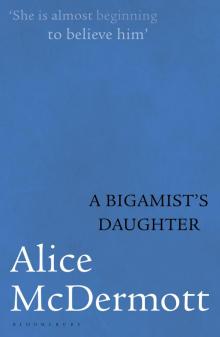 A Bigamist's Daughter
A Bigamist's Daughter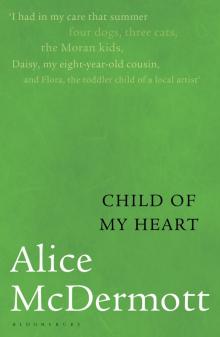 Child of My Heart
Child of My Heart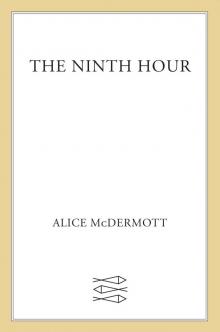 The Ninth Hour
The Ninth Hour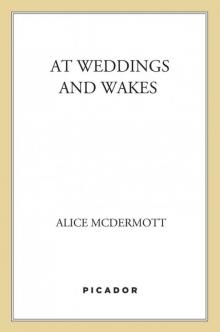 At Weddings and Wakes
At Weddings and Wakes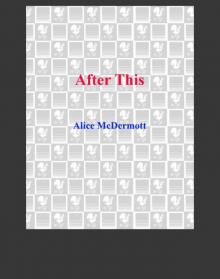 After This
After This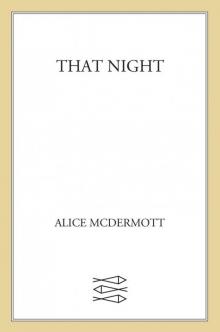 That Night
That Night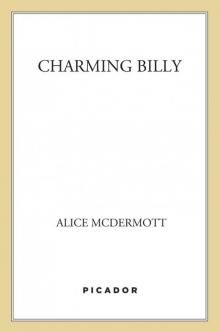 Charming Billy
Charming Billy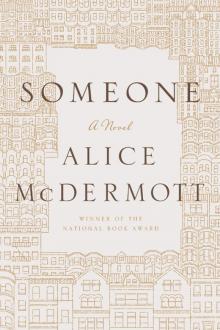 Someone
Someone